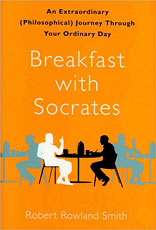"The everyday is 99 percent of our lives; if we don't think about it while we live it, there's not going to be much time left over for reflection. And if we do, we might learn to appreciate the importance behind the apparently trivial things we do so automatically, such as getting dressed and falling asleep, and see them in a new light," writes philosopher and former Oxford fellow Robert Rowland Smith.
We are always on the lookout for books which creatively explore the meaning of our everyday activities. Breakfast with Socrates fills the bill and does so with considerable breadth and depth. Smith gives philosophy a new burst of energy by taking it off the esoteric shelf and putting it back into circulation on the streets. This pursuit of truth can get pretty abstract: think of the humorous definition of philosophy as "a blind man in a dark room looking for a black cat which does not exist." Now contrast that with Smith's down-to-earth ponderings about things we do every day of our lives without paying attention. An early quotation by Annie Dillard sums it all up: "How we spend our days is, of course, how we spend our lives."
Smith sees waking up in the morning as a philosophical act, "a direct encounter with consciousness and existence." He calls upon political theorist Thomas Hobbes for advice on our morning commute and handling the savage inside us. At work, Karl Marx is on hand to counsel us about the trouble with being a wage slave. At the gym, social historian Michel Foucault is available as a counselor who sees our exercise routine as a form of state control. Machiavelli gives us tips about throwing a party. Jacques Lacan, a psychoanalyst, conjures up the perils of narcissim as we shop. And the Buddha has some ideas about staying awake while we are taking a bath.
In a chapter on "Reading a Book," Smith observes: "A book is like an orchestral score, with you, the reader, a conductor who teases sounds from a page that would otherwise remain mute." We like the way the author spices up the proceedings with commentary on films and other pop artifacts. We were also impressed with the ease with which he draws out meanings from other experiences of an ordinary day such as having lunch with your parents, booking a holiday, watching TV, cooking and eating dinner, arguing with your partner, having sex, and falling asleep and dreaming.
